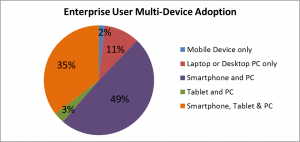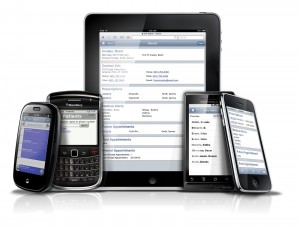When people think of IT mobility, the images most immediately conjured regard smartphones and tablets. In truth, however the mobile device landscape could be considered broader than this. The basic definition of a mobile device is simply “any computing device designed principally for portability.” By that definition, laptops should clearly be included in that scope. However, some definitions state that a mobile device must be “handheld” indicating size is a factor without actually specifying how small a device must be to achieve that designation. Regardless of size limitations, those definitions still favor inclusion of laptops since many are available with a form facture that is smaller than some of the larger tablets. Therefore, the defining descriptor for a mobile device must fall to its portability, which also happens to be the key differentiator between a laptop and a desktop PC. Logically, therefor, a laptop is, in fact, a mobile device.
Are Laptops Really Mobile Devices?
By Steve Brasen on Sep 25, 2015 10:39:16 AM
Top 5 Trends in 2015 for Unifying PC and Mobile Management
By Steve Brasen on Feb 12, 2015 9:18:00 PM
Have you ever tried to create a major slide presentation on a tablet? Or edit a large spreadsheet? Or write a long document? Probably not. While it’s certainly possible to perform more substantial business tasks on a tablet, the small screen real estate and limited system resources (e.g., processing speed, memory, graphic support, etc.) are typically insufficient in current tablet form factors. However, carrying a laptop around with you everywhere you go just so you can access email is not very practical either. The reality is that we live in a multi-device world where the average worker employs 3 – 5 different computing devices in the regular performance of their job function. . . . and I would argue that’s exactly how it should be. Each user employs the device they prefer to optimally perform tasks at any particular time or place.
Don’t Believe Everything You Read – Especially About Enterprise Mobility!
By Steve Brasen on Jan 17, 2014 11:12:53 AM
I just got off the phone with a reporter from a major industry trade magazine (no names please!) who is preparing an article on enterprise mobile device adoption. Wanting to help ensure accuracy in the reporting, I provided him with statistical details from our recent research into the use of mobile devices in the enterprise and stepped him through the findings. He was fascinated by the results and asked lots of follow-up questions. In the end, however, he admitted he would likely not be able to use any of the information in his article (say what?!). Apparently, his editor had specifically tasked him with writing an article showcasing how tablets are rapidly replacing PCs in the workplace, even though this is completely contradictory to reality.
Maybe We Should Call It The “Pre-Post-PC” Era?
By Steve Brasen on Jun 6, 2013 9:48:41 AM
IT marketing hype has generated quite a few ridiculous and sometimes outright bizarre phrases to describe trends in technology adoption, but few on the list of the absurd top the insistence that we live in a “post-PC” era. The concept of “post-PC” derives from the (correct) fact that mobile device adoption has broadly accelerated, but makes the incorrect assumption that this is causing a substantial decrease in PC use. Nothing could be further from the truth – especially in relation to the business use of desktop and laptop PCs.
Viva la Mobile Revolution!
By Steve Brasen on Oct 19, 2011 11:08:38 PM
Put this picture in your mind’s eye – It’s a beautiful sunny weekday and you’re sitting by a pool catching the sun’s rays and a cool breeze. Strategically placed within arm’s reach beside you is some kind of fruity drink with a tiny bamboo umbrella in it. You are working (yep, I said working!). You punch in the last financial figures into your iPad and check your calendar to see it’s time for the board meeting, which you dial into using your smartphone. Alright, truth-to-tell, you’re more apt to be using your mobile device while waiting on a line at the bank than sitting by a tropical pool, but the basic point is the same – mobile devices mean freedom for employees.





